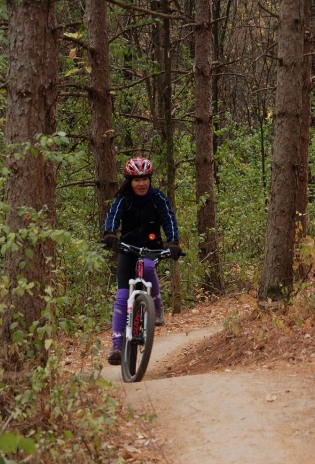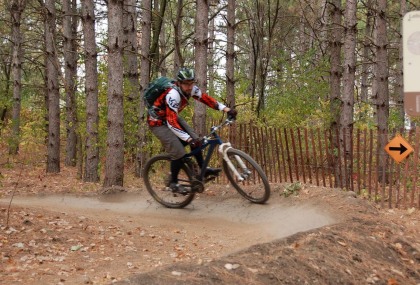
Lebanon Hills.
(Photo used with permission of
Dakota County Parks, Minnesota)
This article is written by Joshua Rebannack. Joshua contacted me after he read our recent coverage of mountain biking in Forest Park. As a way of helping Portland see a different vision for urban, off-road bicycling access, Joshua wanted to share how the issue has evolved in riding areas around Minneapolis, Minnesota. — Jonathan
—
My name is Joshua Rebennack. I’m a “Dirt Boss” at the Cuyuna Lakes Mountain Bike Trails and a member of the Cuyuna Lakes Mountain Bike Crew. I am writing this guest article in response to some of the controversy surrounding the possible inclusion of mountain biking at Forest Park.
Below I’ll discuss an example trail in an urban setting, Lebanon Hills Regional Park in Eagan, Minnesota, and the lessons the citizens of Portland can learn from it.
While it might seem an odd choice comparing a West Coast location with Midwest, there are more similarities than one might think. Both Portland and Twin Cities (including Eagan) are at similar latitudes. While Portland prides itself on its rainfall, actually, the Twin Cities receives somewhat similar amounts of precipitation, though far more of it in snow. They both have similar political climates. And both are biking hot- spots.
Urban Mountain Biking Example – Lebanon Hills Regional Park, Eagan, MN


(Photo: Used with Permission of Dakota County Parks)
Lebanon Hills is a 2,000 acre park located in Eagan, MN. Originally a Dakota County park, urban and suburban sprawl have now surrounded Lebanon Hills on all sides. The park is bordered directly by single-family housing developments and commercial properties.
In the 1990s, the only section of the park with any official mountain biking access was the Northwest corner of the park. The “mountain bike trail” was a 2.5 mile long loop of rutted gravel and dirt roads. In 1998, however, Dakota County decided that it needed a Master Plan to address long-term usage of the park.
As the Master Plan committee was assembled, Dakota County included stakeholders from every recreational activity the park could accommodate. That included mountain bikers, represented by the president (at the time) of the nascent off-road trail advocacy group Minnesota Off-Road Cyclists (MORC). It took a year to assemble all the stakeholders, and an additional two years of committee meetings to hammer out the final Master Plan. In regards to mountain biking, it was decided to move from the old double-track to singletrack. In the end, the final plan for mountain biking at Lebanon Hills had the following components:
- Mountain bike trails would be completely segregated from other trails to mirror the previous usage and prevent future biker/hiker conflicts.
- One way trails would allow the narrowest singletrack tread.
- The area for the mountain bike trails would be limited by definable boundaries to allow Dakota County to monitor the trails more easily and to prevent riders from finding their way onto other trails.
- A 1/2 mile test loop would be built first to prove that mountain bike trails could be built sustainability and that users would be responsible in using them.
- All abandoned, illegal, and sub-standard trails would have to be reclaimed.
All of these features, and the willingness of MORC to build the trail and fund the construction, helped Dakota County green-light singletrack at Lebanon Hills. Construction started on the 1/2 mile test loop on June 25, 2002.
The test loop was a resounding success. Even with constant traffic, the sustainable trail design choices proved themselves. Additional trail mileage was put in nearly as fast as it could be approved: in 2004, 2006, 2008, 2010, and 2011. By 2006, Lebanon Hills became completely singletrack as the last of that old rutted road was reclaimed.
While it would be easy to talk about mountain bikers feelings on the trails, what really matters in context of the current debate in Portland is the land manager’s reaction to the trails. In a question and answer email Katie Pata, Park Operations Coordinator for Dakota County, explains her feelings:
“I’m in charge of day-to-day park operations for Dakota County, especially for Lebanon Hills Regional Park, our biggest and busiest (over 500,000 annual visits) park. Lebanon Hills Regional Park is home to nearly 12 miles of single track mountain bike trails and a new state-of-the-art mountain bike skills park. This successful trail system was built by mountain bikers for mountain bikers with careful but creative oversight by Dakota County. As the land manager, it’s our job to ensure public lands are cared for and managed in way that’s sustainable, in line with our mission and in the best interest of the public. MORC’s commitment to sustainable trail design and making mountain biking a new, accessible recreational opportunity for Dakota County residents and beyond has proved to be invaluable.”

(Photo: Used with Permission of Dakota County Parks)
As is typical of mountain bike trails in Minnesota, the trails are built on municipal land, but MORC takes the burden of maintaining them. “The mountain bike trail system is made completely possible by a dedicated group of volunteers with [MORC],” Pata continues. “Volunteers meet weekly in the summer months for trail building and maintaining. They are also on call to help with downed tree removal and even winter [mountain bike] trail grooming. Without [these] volunteers and the expertise, partnership and support they bring, Lebanon would not be what it is today. We have great topography and soils that make it easier to have the type of trail system we do, but really what makes the gears turn is an active, dedicated respectful group of mountain bike enthusiast volunteers.”
But doesn’t the amount of riders and the pressure they place on the park and its forest lands create greater impacts? Actually, the opposite has turned out to be true. Again, Pata explains,
“It sometimes seems like because many know the Lebanon Hills mountain bike trail system is maintained by volunteers, users take better care of it — not riding during wet conditions and not littering.” That sense of belonging extends, not just to adults, but all riders. “Mountain biking is connecting with teens who are sometimes under served in an overall park system. Mountain biking not only brings in a new user base in teens and young adults, it brings a sense of community strength, pride and awareness with its close ties to volunteerism and trail stewardship.”
As of this writing, Lebanon Hills is one of 18 urban or suburban mountain biking trails in the greater Twin Cities Metro area. Two more are in the process of getting approval. With the continued expansion of light rail and bike greenways, it’s increasingly possible to bike from your home to a mountain bike trail in Twin Cities Metro area.
Potential Lessons for Urban Mountain Biking in Portland
So in the final analysis, what are the lessons for Portland? Well, Portland isn’t the first city to grapple with question of urban mountain biking and it won’t be the last. The trick is to look at those places that have come before and see what answers they had to the questions urban mountain biking raises. I would argue strongly that there is no better place to look for those answers than Minnesota. Minnesota has shown that issues concerning mountain biking, real or imagined, can be designed around. The trails in Minnesota, both urban ones like Lebanon Hills, and rural ones like the Cuyuna Lakes Mountain Bike Trails, are considered the best in the Midwest because of those design choices. Most importantly, Minnesota Off-Road Cyclists, with their land manager partners, have proved with over a decade of trail stewardship that ecologically sustainable, fun, and land manager friendly trails are not only possible, they can be the norm.
Pata was asked “If you were speaking to the citizens of Portland, what would you say to them?” I think there is no better way to end this article than with her response:
“Mountain biking has found a re-birth over these past years and I see it continuing to grow in popularity It’s common to have 300+ riders per day on our trail system in good weather conditions — most come for their hour or two hour ride and head home — it’s their daily workout. Many neighbors to the park have said they chose to move here because of the trail system at Lebanon Hills. Local businesses, including our own campground, have definitely benefited — it’s not only a city draw, but a state and even regional draw.
Mountain biking is opening doors, especially for teens who can’t find a good fit with traditional organized group sports like football, volleyball or basketball. I’ve seen kids barely walking on strider bikes and families with tandem bikes. It’s a sport for everyone with a bike. And if you don’t have one, hopefully there’s a bike demo trailer or bike shop nearby that can rent you one or use one for free. It’s a lifetime skill and a pasttime, something that crosses generations. It has a strong community building component — where cyclists love to ‘talk shop’ after a ride, share helmet camera videos, grill out or hit up the local eatery, and more. Overall, working with the mountain bike community is a highlight of what I get to do and model of example how to cost-effectively manage a public recreational opportunity.”
Browse the archives for more guest articles and reader stories. If you have something to share, please get in touch.


